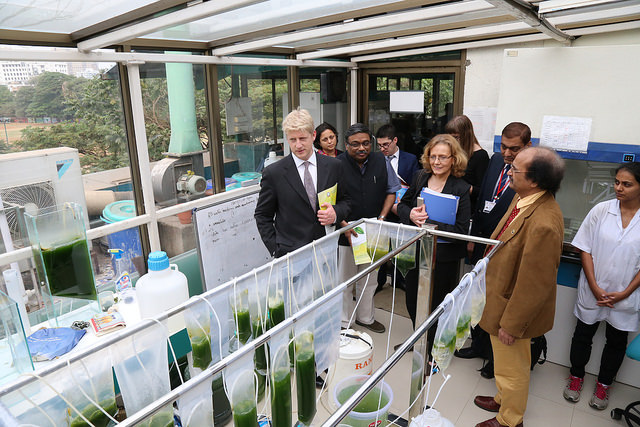
Madeline Burke, PhD Student, Bristol Centre for Functional Nanomaterials, University of Bristol
As a PhD student I rarely get exposed to aspects of academic life such has grant writing, policy and management. So when the opportunity came up to apply for a 3 month internship at the Parliamentary Office of Science and Technology (POST), funded by the Engineering and Physical Sciences Research Council (EPSRC), I jumped at the chance.
POST, as it is known, is based at the heart of Westminster. It serves both Houses of Parliament in providing impartial advice to parliamentarians on science and technology policy issues; often in the form of briefing papers called POSTnotes. POST was formed by a group of MPs and Peers concerned at the lack of scientific evidence available to influence Parliamentary policy and in 2001 both Houses decided that POST should be established as a permanent bicameral institution.
However, POST is not the only parliamentary office providing scientific information to parliamentarians. They also work alongside the House of Commons (HoC) Library, which provides impartial information and research services for Members of Parliament and their staff in support of their parliamentary duties such as debate packs to give MPs background information about upcoming debates. The Library also provides an enquiry service for MPs on any topic required.
I started working as a POST fellow in October 2015, and was seconded to the HoC Library to work in their Science and Environment section.
I was assigned to work on a green energy briefing note, looking in particular at aspects of solar farms policy, such as funding, planning and possible impacts. Although initially a little daunted by the prospect of writing a 40-page briefing on something I had little knowledge in, this was an excellent way to make sure I would approach the subject with impartiality, impartiality being a matter of pride for the HoC Library and POST.
![By MrRenewables Westmill Solar Co-operative Ben Cavanna (Own work) [CC BY-SA 3.0 (http://creativecommons.org/licenses/by-sa/3.0) or GFDL (http://www.gnu.org/copyleft/fdl.html)], via Wikimedia Commons](https://policybristol.blogs.bris.ac.uk/files/2016/09/Westmill_Solar_Cooperative_1.jpg)
Westmill Solar Park, Oxfordshire. By MrRenewables Westmill Solar Co-operative Ben Cavanna (Own work) [CC BY-SA 3.0 (http://creativecommons.org/licenses/by-sa/3.0) or GFDL (http://www.gnu.org/copyleft/fdl.html)], via Wikimedia Commons
Simultaneously, I was tasked with answering scientific queries from MPs. The best way to describe this work is as “a call centre for MPs” who can, and do, ask any question they need answering. Questions ranged from constituent enquiries about overflowing drains running through their land, to enquiries about upcoming debates, such as on the dog meat trade or EU regulation of medicinal drugs. I found this part of the job fascinating – having to research a new topic quickly and become “an expert” in a very short space of time was really exciting.

nyphotographic.com/Blue Diamond Gallery (CC BY-SA 3.0)
Deadlines were often a matter of hours at most; in one case an MP needed as much information on the water industry as possible, in 30 minutes, ahead of a BBC news interview. All my work was checked over by the relevant subject specialist, the House of Commons employee whose job it is to keep abreast of developments in a particular scientific field, to ensure that the information I was providing was correct and unbiased.
One of the best things about working for the Houses of Parliament was the access to the Palace of Westminster. The Library is based in a building outside the main Westminster estate, but each week I was able to walk over to the Palace and go for Friday lunch on the Terrace, watching boats sail past, and MPs and palace staff enjoying their fish and chips.
I was also able to attend Select Committee meetings. A few particular highlights include watching the Science budget hearing where Jo Johnson, Minister for Universities, was questioned about the cuts he was planning to make, and watching Jamie Oliver give evidence about rising obesity rates in the UK, where he utterly charmed the Chair of the Health Committee, Dr Sarah Wollaston.

UK’s minister of State for Universities and Science, Jo Johnson speaking to students of Institute of Chemical Technology Mumbai, December 2015. British High Commission, New Delhi/Flickr (CC BY-NC-ND 2.0)
Right at the end of my fellowship, the briefing paper I had been working on at the HoC Library, “Number 07434, Solar Farms: Funding, planning and impacts” was published. This was the culmination of three months hard work so I was naturally very pleased!
However, imagine my horror when the very next day the Government made an announcement detailing new policies in solar energy. My briefing paper was quickly taken down and I amended the website blurb to reflect that changes were being made to policy and that the note was being updated. This was followed by frantic emailing and researching to incorporate the new policies into my briefing. The above is an example of how quickly science policy changes, and how fast the science and environment section of the Library has to react when new policies are announced. It gives the term ‘fast-paced’ a whole new meaning.
Indeed, the biggest thing that struck me while working in science policy in Parliament is how interconnected everything is. For example, the HoC Library work closely with the Science and Technology Select Committee to ensure evidence being presented to MPs and Peers is impartial and comes from a wide range of sources. These different parts of Parliament – Library, POST and committee clerks – are always looking at the bigger picture, predicting the drivers of scientific research over the next forty years, and digging into the incredible breadth of subjects required in order to formulate with scientific policy.
I have a much greater respect for people that work in Parliament, and the parliamentarians themselves, now that I have a better appreciation of what they do.
You can find out more about the Research Council Policy Internships Scheme here.
